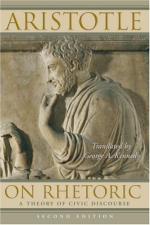
|
| Name: _________________________ | Period: ___________________ |
This test consists of 5 multiple choice questions, 5 short answer questions, and 10 short essay questions.
Multiple Choice Questions
1. Why did Aristotle consider metaphors to be useful in Book III, Chapter 10?
(a) People enjoy thoughtful ideas.
(b) People connect with sensible ideas.
(c) People enjoy new ideas.
(d) People connect with similar ideas.
2. What was the basic method used in the a fortiori argument that Aristotle referred to in Book II, Chapter 23?
(a) To prove one thing by proving another first.
(b) To focus on only one position at a time.
(c) To argue two entirely different things at once.
(d) To focus on several positions at once.
3. Using an example of the similarities or differences between parents and their children, how did Aristotle describe Socrates' children?
(a) Intelligent.
(b) Irrational.
(c) Rational.
(d) Foolish.
4. In Book II, Chapter 26, how many common errors did Aristotle discuss?
(a) Three.
(b) None.
(c) One.
(d) Two.
5. According to Aristotle, what was epideictic rhetoric most likely to deal with?
(a) Small crowds of educated people.
(b) Large crowds of educated people.
(c) Large crowds of uneducated people.
(d) Small crowds of uneducated people.
Short Answer Questions
1. As explained in Book III, Chapter 3, in what way did writers misuse the epithet?
2. Why was a refutative enthymeme considered to be more effective by Aristotle?
3. How many periods of a lifetime did Aristotle discuss in Book II, Chapter 12?
4. As both illustrations and fables utilized imagery to make a point, what type of imagery did Aristotle think fables used?
5. In Aristotle's opinion, why should political rhetoric focus the most on sound argumentation?
Short Essay Questions
1. What value could surprises have in a speech, and what were some of the forms they could take?
2. What were some of the characteristics of a refutative enthymeme?
3. What were the four ways that Aristotle listed about how objections could be raised?
4. Based on Aristotle's discussion at the beginning of Book II, Chapter 12, which things could influence a person's feelings?
5. As explained by Aristotle, what four common mistakes were made while writing prose?
6. How did Aristotle explain the different kinds of arguments used by the three types of rhetoric in Book II, Chapter 18?
7. What clarification did Aristotle make about amplification, enthymemes, and the soundness of enthymemes at the end of the section?
8. What were some of the ways Aristotle described what was and was not possible in rhetoric and oratory?
9. Which styles of political, forensic, and epideictic rhetoric were discussed at the end of Book III, Chapter 12?
10. What would the a fortiori argument refer to in rhetoric?
|
This section contains 855 words (approx. 3 pages at 300 words per page) |

|




